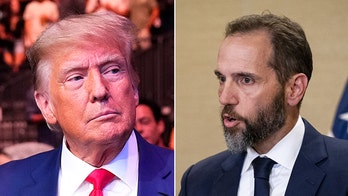Julian Assange: A Complex Legacy of Press Freedom and National Security
- June 27, 2024 11:04pm
- 396
The release of Julian Assange from a London prison on Tuesday raises questions about the role of journalism, the importance of press freedom, and the limits of national security. Assange, who spent 14 years in confinement, was the founder of WikiLeaks, a website that published classified military documents. While some see him as a martyr for press freedom, others believe he is a criminal who endangered national security.
The release of Julian Assange from a London prison on Tuesday marks a significant moment in the ongoing debate about the role of journalism, the importance of press freedom, and the limits of national security. Assange, the founder of WikiLeaks, spent 14 years in confinement, including five years in Britain's harsh Belmarsh prison, for his role in publishing classified military documents.
Supporters of Assange, including his family, close associates, and many journalists, hailed his release as a victory for press freedom. They argue that Assange was a whistleblower who exposed war crimes, corruption, and other wrongdoing by the U.S. government. They believe his prosecution was an attempt to intimidate journalists and suppress dissent.

Julian Assange: A Complex Legacy of Press Freedom and National Security
Critics of Assange, however, argue that he was a criminal who endangered national security by publishing classified information. They point to the fact that Assange was charged with espionage by the U.S. government and that he was convicted of jumping bail in the United Kingdom. They believe his release sends a dangerous message that it is acceptable to leak classified information.
The debate over Julian Assange is a complex one, with no easy answers. It is important to consider the arguments of both sides and to weigh the competing interests of press freedom and national security.

Julian Assange: A Complex Legacy of Press Freedom and National Security
Press freedom is a fundamental right that is essential for a functioning democracy. A free press allows journalists to investigate and report on important issues, even if those issues are embarrassing or inconvenient to the government. Press freedom also helps to protect citizens from government overreach and corruption.
The First Amendment to the U.S. Constitution guarantees freedom of the press. However, there are limits to press freedom. The government can restrict speech that is likely to incite imminent violence or that poses a clear and present danger to national security.

Julian Assange: A Complex Legacy of Press Freedom and National Security
National security is also a vital interest of the government. The government has a responsibility to protect its citizens from harm, both foreign and domestic. This includes protecting classified information that could be used by enemies to harm the country.
The government can take steps to protect national security, such as classifying information and prosecuting those who leak classified information. However, the government must also be careful not to overreach in its efforts to protect national security. This is because national security can be used as an excuse to suppress dissent and silence critics.

Julian Assange: A Complex Legacy of Press Freedom and National Security
The Julian Assange case raises important questions about the balance between press freedom and national security. It is a complex issue with no easy answers. However, it is important to have a public dialogue about this issue in order to ensure that both press freedom and national security are protected.
The release of Julian Assange is a significant moment in the ongoing debate about the role of journalism, the importance of press freedom, and the limits of national security. The debate over Assange is a complex one, with no easy answers. It is important to consider the arguments of both sides and to weigh the competing interests of press freedom and national security.
Related articles
-
 Trump's Legal Defense Bolstered as Supreme Court Cripples DOJ's Jan. 6 Investigation
The landmark Fischer v. United States ruling has severely weakened the Justice Department's case against former President Donald Trump and the Jan. 6...
Trump's Legal Defense Bolstered as Supreme Court Cripples DOJ's Jan. 6 Investigation
The landmark Fischer v. United States ruling has severely weakened the Justice Department's case against former President Donald Trump and the Jan. 6...
- 01 Jul 2024
-
 Biden's Energy Policies: A War on Fossil Fuels, a Burden on Consumers
The Biden administration's energy policies have taken a heavy toll on consumers, leading to higher prices and a growing reliance on imported...
Biden's Energy Policies: A War on Fossil Fuels, a Burden on Consumers
The Biden administration's energy policies have taken a heavy toll on consumers, leading to higher prices and a growing reliance on imported...
- 30 Jun 2024
-
 Trusting in Surrender: Lessons in Joy from a Dog and the Grateful Dead
In this heartwarming essay, Mike Kerrigan reflects on the profound lessons he has learned about trust, surrender, and joy from his dog, Sugaree, and...
Trusting in Surrender: Lessons in Joy from a Dog and the Grateful Dead
In this heartwarming essay, Mike Kerrigan reflects on the profound lessons he has learned about trust, surrender, and joy from his dog, Sugaree, and...
- 30 Jun 2024
-
 The Vice Presidency: A Path to the Presidency
Senator Tim Scott argues that the vice president should possess specific characteristics, and the choice of running mate can significantly impact...
The Vice Presidency: A Path to the Presidency
Senator Tim Scott argues that the vice president should possess specific characteristics, and the choice of running mate can significantly impact...
- 29 Jun 2024
-
 The Times' Hail Mary: Can Biden Be Replaced?
Amidst calls for a replacement, Democratic strategists weigh the pros and cons of replacing Joe Biden as the Democratic nominee before the 2024...
The Times' Hail Mary: Can Biden Be Replaced?
Amidst calls for a replacement, Democratic strategists weigh the pros and cons of replacing Joe Biden as the Democratic nominee before the 2024...
- 29 Jun 2024
-
 Republicans' Healthcare Plan: Putting Patients Back in the Driver's Seat
Republicans are proposing a series of healthcare reforms aimed at empowering patients and improving affordability, including expanding price...
Republicans' Healthcare Plan: Putting Patients Back in the Driver's Seat
Republicans are proposing a series of healthcare reforms aimed at empowering patients and improving affordability, including expanding price...
- 28 Jun 2024

Leave a comment
Your comment is awaiting moderation. We save your draft here
0 Comments
Chưa có bình luận nào